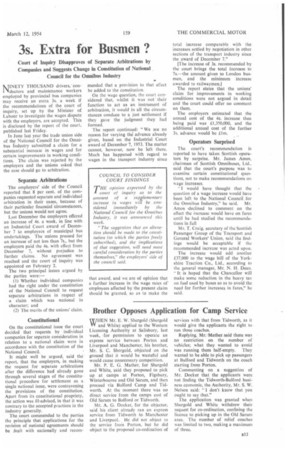3s. Extra for Busmen ?
Page 49

If you've noticed an error in this article please click here to report it so we can fix it.
Court of Inquiry Disapproves of Separate Arbitrations by Companies and Suggests Change in Constitution of National Council for the Omnibus Industry
MINETY THOUSAND drivers, con ductors and maintenance workers employed by provincial bus companies may receive an extra 3s. a week if the recommendations of the court of inquiry, set up by the Minister of Labour to investigate the wages dispute with the employers, are accepted. This is disclosed by the report of the court, published last Friday. In June last year the trade union side of the National Council for the Omnibus Industry submitted a claim for a substantial increase in wages and for certain improvements in working conditions. The claim was rejected by the employers and the unions asked that the case should go to arbitration.
Separate Arbitrations
The employers' side of the Council reported that 8 per cent. of the companies requested separate and individual arbitration in their cases, because of their particular financial circumstances, but the unions would not agree.
Last December the employers offered an increase of 4s. a week, in line with an Industrial Court award of December 7 to employees of municipal bus undertakings. The unions pressed for an increase of not less than 7s., but the employers paid the 4s. with effect from December 7, without prejudice to further claims. No agreement was reached and the court of inquiry was appointed on February 2.
The two principal issues argued by the parties were:—
(1) Whether individual companies had the right under the constitution of the National Council to request separate arbitrations in respect of a claim which was national in character; and (2) The merits of the unions' claim.
Constitutional
On the constitutional issue the court decided that requests by individual companies for separate consideration in relation to a national claim were in accordance with the constitution of the National Council.
It might well be argued, said the report, that the employers, in making the request for separate arbitrations after the difference had already gone through several stages of the constitutional procedure for settlement as a single national issue, were contravening the provisions of the constitution. Apart from its constitutional propriety, the action was ill-advised, in that it was contrary to the accepted practices in the industry generally.
The court commended to the parties the principle that applications for the revision of national agreements should be dealt with nationally and recom
mended that a provision to that effect be added to the constitution.
On the wage question, the court considered that, whilst it was not ' their function to act as an instrument of arbitration, it would in all the circumstances conduce to a just settlement if they gave the judgment they had formed.
The report continued: "We see no reason for varying the advance already given, based on the Industrial Court award of December 7, 1953. The matter cannot, however, now be left there. Much has happened with regard to wages in the transport industry since that award, and we are of opinion that a further increase in the wage rates of employees affected by the present claim should be granted, so as to make the total increase comparable with the increases settled by negotiation in other sections of the transport industry since the award of December 7."
[The increase of 3s. recommended by the court brings the total increase to 7s.—the amount given to London busmen, and the minimum increase awarded to railwaymen.] The report states that the unions' claim for improvements in working conditions were not argued in detail and the court could offer no comment on them.
The employers estimated that the annual cost of the 4s. increase then being paid was 0,350,000, and the additional annual cost of the further 3s. advance would be Lim.
Operators Surprised
The court's recommendation is reported to have taken Scottish operators by surprise. Mr. James Amos, chairman of Scottish Omnibuses, Ltd., said that the court's purpose was to examine certain constitutional questions, not to make recommendations on wage increases.
"I would have thought that the question of a wage increase would have been left to the National Council .for the Omnibus Industry," he said. Mr. Amos .declined to comment on the effect the increase would have on fares until he had studied the recommendations in full Mr. T. Craig. secretary of the Scottish Passenger Group of the Transport and General Workers' Union, said the findings would be acceptable if the recommended increase was acted upon.
The increase would add another 137,000 to the wage bill of the Yorkshire Traction Co., Ltd., according to the general manager, Mr. N. H. Dean. " It is hoped that the Chancellor will make some reduction in the heavy tax on fuel used by buses so as to avoid the need for further increases in fares," he said.




































































































